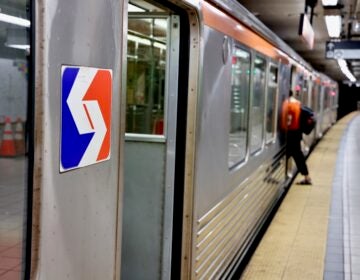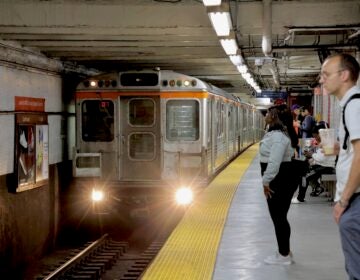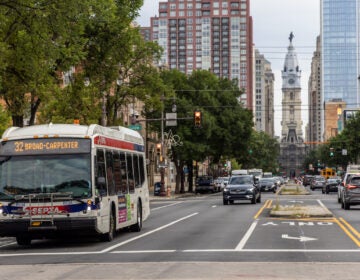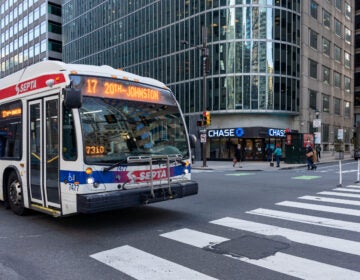Lawsuit challenges SEPTA cuts over impact on minority and low-income riders
The lawsuit was filed by local attorney George Bochetto, who previously fought the removal of the Christopher Columbus statue in Marconi Plaza.
Listen 1:29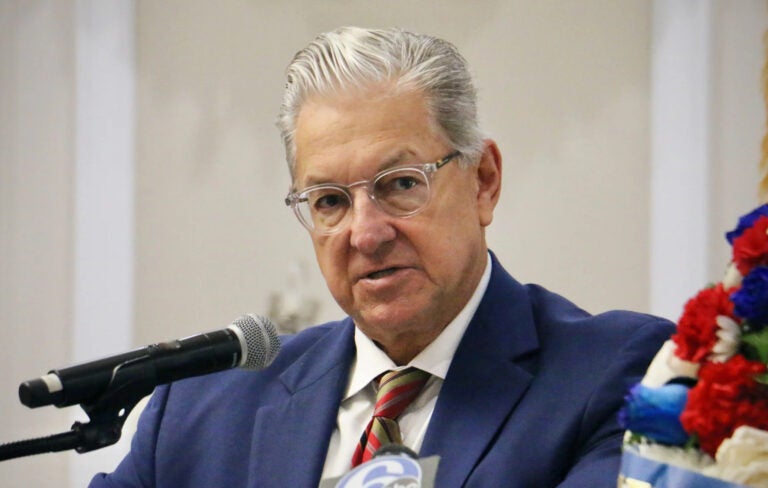
File - Philadelphia lawyer George Bochetto speaks during a memorial service in December 2021. (Emma Lee/WHYY)
From Philly and the Pa. suburbs to South Jersey and Delaware, what would you like WHYY News to cover? Let us know!
Consumer advocates and two city residents filed a lawsuit on Wednesday seeking to block SEPTA’s recently enacted service cuts, arguing that the reductions disproportionately harm Black, Latino and low-income riders while shielding wealthier Regional Rail commuters.
The complaint, filed in Philadelphia Common Pleas Court by lawyer George Bochetto, contends that SEPTA is “making up” the “fiscal crisis” in order to pressure state lawmakers for additional funding, using riders as bargaining chips.
“The impetus behind it is to hold SEPTA accountable for this false financial crisis that they’ve manufactured and using the Philadelphia working class and students as pawns in their struggle with Harrisburg,” Bochetto told WHYY News.
Bochetto is a Philadelphia-based trial lawyer known for a fiery courtroom presence and high-profile cases, including in opposition to the removal of the Christopher Columbus statue in Marconi Plaza. He also contributed to the legal defense in former President Trump’s second impeachment trial. He has run for Philadelphia mayor and in the Republican primary for U.S. Senate in 2022 for the seat now held by John Fetterman.
Bochetto brought the lawsuit on behalf of consumer advocate Lance Haver and two longtime SEPTA riders, Tennille Hannah and Johndell Gredic, who say the elimination or overcrowding of bus routes has upended their daily lives and forced them into unsafe or costly alternatives. Hannah, a paralegal and single mother, said the cuts to the Route 12 bus left her teenage children navigating multiple transfers late into the evening.
Lance Haver is a longtime consumer advocate in Philadelphia who served as the city’s consumer affairs director and director of civic engagement for City Council. He writes consumer-oriented pieces for the Philadelphia Hall Monitor on topics such as utility rates, housing policy and SEPTA finances.
What’s in the lawsuit?
At issue is SEPTA’s decision to eliminate 32 bus routes and shorten 16 others, while leaving Regional Rail service — used more by white suburban residents — largely untouched until at least January. The plaintiffs argue that the move violates Pennsylvania’s equal protection clause and state civil rights statutes.
“SEPTA, themselves, conducted an equity study and acknowledged that it will have a disparate impact on racial minorities and low-income communities,” Bochetto said. “Their own report admits it.”
SEPTA spokesperson Andrew Busch disputed that.
“SEPTA conducted a full equity analysis in accordance with all applicable regulations before proposing the plan for service cuts and fare increases to address our structural budget deficit,” Busch said, adding that there was “an extensive public process and education campaign surrounding the proposal along with a series of public hearings that were overseen by an independent examiner.”
SEPTA previously released the results of a Title VI equity study it performed before enacting the cuts, in which it “found that non-minority routes and non-low-income routes bear a larger share of the overall service reduction.”
However, Haver, the plaintiff, said the first round of cuts itself is discriminatory.
“The fact is the burden right now falls most heavily on the bus riders,” he said. “Not a single Regional Rail line has been eliminated, but 3,000 bus stops have been eliminated and over 30 bus routes have been eliminated and many bus routes have been shortened. That falls most heavily on the working poor.”
Erick Guerra, professor of regional planning at the University of Pennsylvania, where he teaches courses in transportation planning, said that is partly true, but the reality is more complicated since “SEPTA is primarily a bus operator.”
“Most of the cuts are going to be coming from buses,” he said. “And the buses are going to be relatively expensive, so if you’re going to save money, you definitely need to cut some bus service. There are different dimensions along which you could examine the issue of fairness.”
He added that some of the bus routes being cut serve suburban areas that already have less overlapping and less frequent service.
However, he agreed with the lawsuit’s overall argument that any cuts to public transportation disproportionately impact lower-income residents.
The complaint also argues that SEPTA has approximately $400 million in its Service Stabilization Fund — resources that could have been drawn upon instead of harming riders. The suit further contends that SEPTA based its budget projections on the unlikely assumption that lawmakers in Harrisburg would provide no financial assistance, a scenario with no historical precedent.
“The bus cuts only save $5 million a month,” Haver said. “They could easily use the money they have in PNC Bank to wait for the state budget to be passed. Instead, they’ve decided to punish the riders because SEPTA doesn’t believe it’ll be successful in its attempt to lobby for additional funding.”
Guerra said that such funds are typically kept ready to be deployed in emergencies, and the sudden budget impasse may or may not qualify.
“My overarching opinion is that at the end of the day, drawing on those funds likely could potentially leave us in a worse situation, just a little bit further down the line,” he said. “That’s not even remotely a long-term solution. We need stable funding mechanisms that are substantially larger than SEPTA rainy day funds.”
SEPTA officials have defended the cuts, saying the agency faces a $213 million operating deficit this fiscal year, with the shortfall projected to persist without a reliable state funding source.
“As we have said consistently, SEPTA did not want to take these steps,” Busch said. “However, service cuts and fare increases are a necessary part of a larger plan to balance the budget, and SEPTA continues to be committed to working with Gov. Shapiro and legislative leaders on a transit funding solution.”
The lawsuit also seeks to prevent a 21.5% fare increase set to take effect Sept. 1. A judge is expected to schedule a hearing soon to consider whether to grant an injunction that would temporarily halt the cuts and fare hike.
This is not the first time SEPTA has faced legal action over service reductions. In 2004 and 2007, lawsuits successfully argued that proposed cuts and fare changes placed an unlawful burden on minority and low-income riders, winning court orders that forced the transit agency to reverse course.
For now, tens of thousands of riders are left navigating longer commutes, more transfers and more crowded buses.

Get daily updates from WHYY News!
WHYY is your source for fact-based, in-depth journalism and information. As a nonprofit organization, we rely on financial support from readers like you. Please give today.



